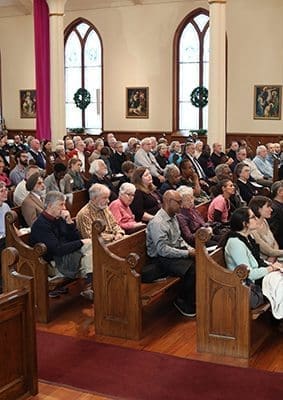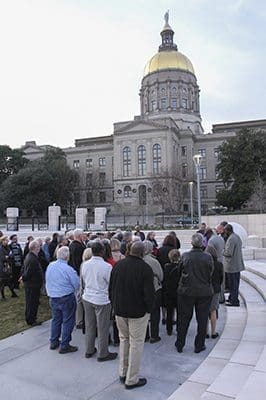After a procession from the Shrine of the Immaculate Conception to Liberty Plaza, (l-r) Archdeacon Carole Maddux of the Episcopal Diocese of Atlanta, Father Kevin Peek, Archdiocese of Atlanta prison ministry chaplain, Bishop Robert C. Wright of the Episcopal Diocese of Atlanta, Rev. Derrick Rice, pastor of Sankofa United Church of Christ, Atlanta, and Mark Lomax of Atlantans Building Leadership for Empowerment (ABLE) stand before the congregation during the prayer vigil. Photo By Michael Alexander
Atlanta
Death penalty opponents address ‘indefensible’ moral, economic, human toll
By ANDREW NELSON, Staff writer | Published January 1, 2016
ATLANTA—A day after the state of Georgia executed its fifth death row inmate of 2015, activists and death penalty opponents gathered at a summit.
The interfaith event, hosted in the shadow of the state Capitol at the Shrine of the Immaculate Conception, brought together some 200 people Dec. 10 to hear from the daughter of an executed inmate, a former justice of Georgia’s highest court, the spiritual leader of the Episcopal Church of Atlanta, a civil rights icon and others.

A crowd of some 200 people attended the Dec. 10 program entitled “Justice and Mercy: An Interfaith Call to End the Death Penalty.” It took place at the Shrine of the Immaculate Conception, Atlanta, and it was sponsored by the Interfaith Coalition to End the Death Penalty. Photo By Michael Alexander
Deacon Richard Tolcher, coordinator of the Atlanta archdiocesan Prison and Jail Ministry, who spearheaded the event, said he hopes the conference serves as a springboard for clergy and lay people to “deliver the message from the pulpit and all other (ways) to spread the truth about the death penalty.” He said people need to talk about the issue in their families, workplaces and neighborhoods.
Justice Norman Fletcher is a former chief justice of the state Supreme Court. Since stepping down, he has renounced the death penalty and called for its abolition.
“Mistakes cannot be undone,” said Fletcher, speaking next to a large drawn portrait of Kelly Gissendaner, executed Sept. 30. He participated in a ruling upholding Gissendaner’s death sentence while on the court. He said more than 150 death row inmates in the United States have been released after evidence proved them innocent. He has “no doubt” innocent people have been executed.
Fletcher, who served for more than 15 years on the Georgia Supreme Court, said the death penalty is “morally indefensible,” “makes no business sense” and is not applied consistently. Fletcher retired from the court in 2005.
In the decade since he stepped down, prisoners he ruled on have been killed in the death chamber. Said Fletcher, “My conscience has not allowed me to forget or downplay my role in the execution of these human beings.”
Fletcher said he’s become persuaded his Christian faith demands the end of executions. “The message of Jesus Christ is all about love. It isn’t about hating anyone. It’s about redemption.”
If people aren’t persuaded by calls for abolition because of morality, there are the economic costs, he said. Death penalty cases, Fletcher said, consume 10 percent of the court’s resources but represent less than 1 percent of court filings. That is money that could be redirected to help the community and police, he said.
Daughter speaks of breaking ‘endless cycle of violence’
In September, Gissendaner, convicted of orchestrating the murder of her husband, Douglas, went to her death singing “Amazing Grace,” according to reports. Her daughter, Kayla, recounted her own story, from learning about her father’s murder and growing up with her grandparents, to reconciling with her mother from behind bars.
The 1997 murder was committed by Kelly Gissendaner’s then boyfriend, who testified against her and did not receive the death penalty.
Kayla Gissendaner was 7 at the time of her father’s murder. She and her mother had an on-and-off relationship until she attended college. After cutting her mother off from a relationship, she decided “to know the answers to my questions about my dad’s death. She told me the terrible truth. I knew I had to move from a place of anger and bitterness to one of love.”
Those conversations led to reconciliation between them during the last six years.
Gissendaner’s March execution was postponed because of problems with the lethal injection drug. She was executed Sept. 30. Kayla said the death penalty creates an “endless cycle of violence.”
Andrew Young, former Atlanta mayor and civil rights colleague of Martin Luther King Jr., encouraged the audience to be creative in tackling criminal justice reform. He mentioned a prison run by a ministry in Korea that is successful in helping prisoners serve a sentence, but with education and training rejoin the community. He also said people need to pray for prosecutors, the governor, jurors and others “we have put in positions that should only be available to God.”
The criminal justice system needs to also show mercy.
“We are not in a system that is ironclad and no way out,” he said. “Our only hope is embrace and mercy.”
Effort to change state law in 2016
A panel discussion with Atlanta Episcopal Bishop Robert C. Wright and representatives from the Southern Center for Human Rights and the Georgia Council on Developmental Disabilities focused on changing state law that sets the bar for executing people with mental disabilities.

Lay people and clerics pray for an end to the death penalty at Liberty Plaza with the Georgia Capitol as a backdrop. Photo By Michael Alexander
Bishop Wright said the death penalty is “inconsistent with the life and ministry of Jesus of Nazareth. He was very clear. Violence wasn’t the answer to violence.”
Activists want to lower the standard of proof for intellectual disability in death penalty cases. Georgia is the only state to use the highest standard of proof to recognize intellectual disability in death penalty cases. The bar is set at “beyond a reasonable doubt.” Of the 33 states with the death penalty, 22 states use the standard of “preponderance of the evidence.”
The PAPE (Proof to a Preponderance of the Evidence) Project is a coalition led by the Georgia Council on Developmental Disabilities, Georgians for Alternatives to the Death Penalty, and Georgia Catholics Against the Death Penalty. The group is advocating during the 2016 legislative session to change the standard of proof to the “preponderance of the evidence” level.
The afternoon event ended with a prayer vigil at Liberty Plaza, in the shadow of the Georgia Statehouse, where people bowed their heads in prayer with a litany of the names of those executed on death row.